
I keep having this strange sense of the hallucinatory as I follow the Boston Marathon story.
And then to follow or attempt to track the public response to the entire city of Boston being under martial law. The docility with which this was accepted is pretty alarming. The public response though cannot be separated from the public’s consumption of Hollywood film, and/or TV and corporate news. The story of the Tsarnaev brothers increasingly resembles a film script. And people increasingly “watch” it as they watch a movie.
But when I say movie, I suppose it’s important to differentiate between corporate product and not corporate –OR–maybe it’s not.
The landscape portrayed in media, against which the bomb attacks took place, is a created simulacra— it is Anytown Kansas by way of Oz. What is missing, is already missing because of Hollywood film. The audience has internalized certain structures and codes. The disappearing reality of the poor and the working poor, the anxiety that infects daily life, the increasingly autistic single minded focus on ‘productive’ labor, on the job. The sense of disconnect, and this increasing resentment, is all invisible. I think now there is something like a supermarket of manufactured realities for the public. People can pick and choose the one to which they wish to subscribe. But it’s more than that; it is the ownership of this selection. And it happens on an individual and a group level. I think the public forms groups based on the selection of manufactured reality they want to believe in. Group solidarity based on which fan club you belong to.
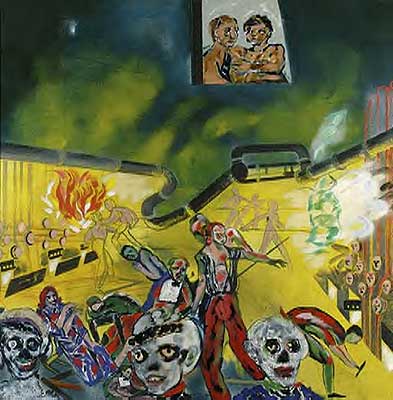
There is a sense of the artificial world beginning to take precedence over direct experience, and this is the effect of electronic media, social media, and movies, and corporate news. They all overlap.
One can see certain fantasy worlds created in Hollywood film and TV. This is sort of obvious, really. Besides the worship of the military and state, themes of patriotism, and the like, there are the secondary tropes of family, of the codes that assign places for gender, race, and the structures as well as dreams of ‘your’ group. Just as an example, if you watch the CBS cop franchise “Blue Bloods”, with Tom Selleck, you see the reactionary white male fantasy world (Bruce Willis films do this almost exactly, as well). A white Catholic male as the benign patriarch of a family of cops. What could be more perfect. There are no drunken fights, no domestic abuse, no rape, no corruption — only a specific brand of male privilege and authority. There is, and this is quite true in any Willis film too, a nostalgia for those simpler times (which never really existed) when white men weren’t so threatened by minorities, by women, by leftists or liberals, and especially by lax morals. In the latest Die Hard installment, this reaches almost surreal levels of anachronism and cognitive dissonance. In the midst of a mass conflagration on the highways of Moscow, Bruce is upset his son isn’t showing proper respect to his father. It is interestingly both ironic and not ironic. It is delivered with a nudge nudge wink wink, at the same time it is completely in earnest.
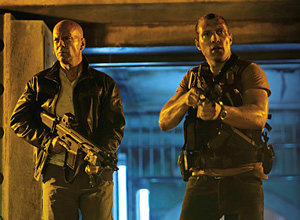
father & son, Good Day to Die Hard
When one looks at the realities of the U.S., among the worlds not on offer, are those Paul Street writes about:
“The fiscal tightening in Washington – primarily the automatic budget cuts imposed by Congress…and the increase in Social Security taxes this year.” Small business is “dead in water” (so says the head of the National Federation of Independent Businesses), generating a bleak mood that “remains stuck near recession levels.”
On the other hand, corporate “earnings” are at record levels. Profits for the largest 100 companies in the Standards & Poor 500 stock index are expected to increase by 6.6% this quarter. Fully 22% of the S&P 500’s profits will come from the nation’s largest 10 publicly traded companies, up from 18% in 2010.[1]
Schwartz could have added that after-tax U.S. corporate profits last year were $1.75 trillion, a more-than-50% increase over the previous record of $1.125 trillion in 2006. He might have noted that, as Joel Geier recently observed in the International Socialist Review, those “profits were the highest percentage of GDP on record, with wages the lowest percentage historically.”
Ok, as a digression….among many…..because one of the things I keep seeing is the intense bullying of anyone (and there ARE a lot) who are having trouble believing the cover story for Boston bombings.
It seems that that a time lag occurs after big catastrophic events….say ten years, usually twenty or thirty, for the facts to emerge. This is because, partly, that by the time these facts emerge, nobody much cares anymore. There are new stories to be distracted by and new events to have covered up. But it is useful to go back and remember…
Operation Gladio (http://www.globalresearch.ca/secret-warfare-operation-gladio-and-natos-stay-behind-armies/5303061)
COINTELPRO (http://www.monitor.net/monitor/9905a/jbcointelpro.html)
and then WACO, (http://topdocumentaryfilms.com/waco-a-new-revelation/)
The list of course could on and on and on. Yellow Cake from Niger, or this http://wideshut.co.uk/lockerbie-bomber-hypocrisy-and-conspiracy/
or this http://www.guardian.co.uk/world/2013/apr/02/mi6-patrice-lumumba-assassination
There are of course many more covert CIA ops (Air America, with Tony Pope et al) or
or Iran Contra, or Hill & Knowlton with their babies torn from incubator stories, or to return to a more direct connection to domestic terror, one has to return to Tim McVeigh and the Oklahoma City bombing. Or, I suppose to James Earl Ray or Lee Harvey Oswald. I would suggest Richard Raznikov be read on the subject of the JFK assassination. And there are countless sources for the facts behind the MLK assassination. The point is, we know the state operates all the time in covert and secret ways. But, one of the prevailing memes in-play today is the one that labels questioning “conspiracy theory” and immediately links it to the fringe kooks who imagine invisible helicopters bombing your houses with gamma rays (it has often occurred to me that Alex Jones was psy ops of some sort, and put there to discredit investigative journalism).
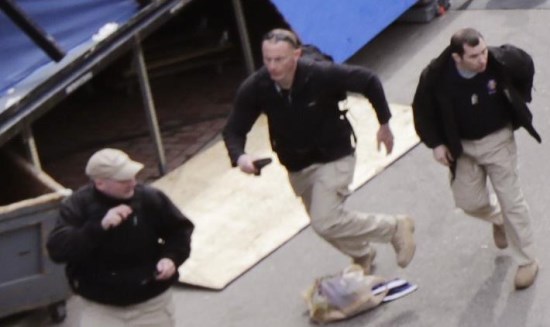
Private security at Boston Marathon.
So since these facts are all available, and I only scratched the surface, really, why is it, as a general rule, labeled “not believable” when, for example, someone posts photos of privitized security men, with back packs, at the site of the explosions in Boston? Now, I have no idea what happened, and have no idea why they were there. But its worth a look I think. But this leads me to what is, I think anyway, my main point. *Believability*.
In a landscape of increased economic polarization, and insecurity, there seems an ever more desperate clinging to establishment narrative by those who are not suffering directly (yet anyway). I think if you canvassed the lowest economic rungs of the U.S. about Boston, you would find a good deal of incredulity about the official version. If you canvas elite upper class neighborhoods I suspect far fewer questions about this version would exist, and much more attention would be devoted to the detailed stories and background analysis of the Tsarnaev brothers. I think what you see when you superimpose these two points of view is the breakdown of cognitive process in the U.S. The self fragemented, compartmentalizing of attention. And this in turn leads to the reliance on these branded codes — whether Tom Selleck or Aaron Sorkin.
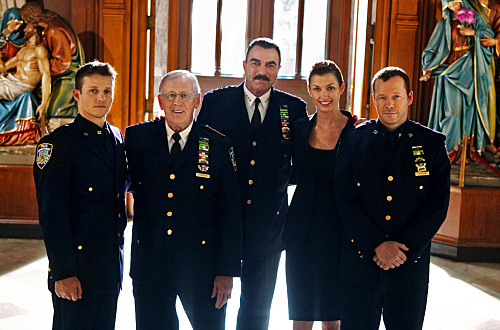
Cast of Blue Bloods
The official *elite* version of the story (the educated classes version) goes like this:
http://www.newyorker.com/talk/2013/04/29/130429ta_talk_remnick
I wont bother linking any of the many pretty loopy sites (so called conspiracy theory sites) out there, but they defy all logic and often, actually, make no sense. However, they do serve the purpose of expressing something of the discontent many people feel. They are irrational, but then so are Astrology columns, and both link in interesting ways to that desire for an unknown, an unsolvable mystery, which in turn is the desire for the spiritual. This is not to say there isn’t terrific ivestigative journalism happening, because it is. But there is a danger, a restraint often, for fear of being called a conspiracy nut.
However, the Remnick version in the New Yorker mystifies every bit as much as Alex Jones, only primarily by omission. The Craft Security guys don’t play a part in this narrative. The echos of Waco or Ruby Ridge or the Murrah Building are left out. There is a tacit backdrop of the rational state.

These partial uncritical perspectives extend, obviously, to the sense of politics.
Paul Street again:
“The powerful and highly class-conscious political and policy actors in the corporate and financial “1%” know all this very well. They do not rely on the market alone to bring about record-setting profits while millions struggle with the merely “human recession” that festers beneath the “statistical recovery.” Behind their “anti-government” and “free market” rhetoric, they pull plutocratic strings to ensure that government works on behalf of big capital and the upward distribution of wealth. Thanks in no small part to their pressure, for example, the White House and Congress imposed the lion’s share of last year’s last-minute tax increase on the working and middle classes – not the so well-to-do who sit atop a class structure that is now so savagely unequal that the six Walton (Wal-Mart) heirs have as much total net worth as the bottom 41.5% of Americans. The majority of the whittled-down Obama tax hike – $125 billion of the $212 billion increase – came from increasing the payroll tax by 2%. This amounted to a 2% wage reduction for all Americans making less than $113,000 a year. Thanks to elite money influence, it remains unthinkable that policymakers would exhibit a serious commitment to deficit reduction and to the reasonable funding of Social Security by getting rid of the blatantly regressive cap on payroll taxation beyond $113,000.”
These are things all but invisible to corporate product. The ruthless conscious policies of brutality and predatory ethics make no appearance in the world of “entertainment”. And if they do, formally speaking, they do in a very particular manner that encloses any idea of dissent — in other words the problem is resolved. Which leads me to ‘believabilty’. I never know what people mean when they say something wasn’t “believable”. It’s as slippery an idea as *fun*. It is one of those notions that can’t be pinned down. Was “Zero Dark Thirty” believable? Was “Argo” believable? There is a blurring that goes on here, between naturalistic behavior, based on accepted notions of motivation, and the macro-meaning which asks the audience place this narrative in an historic context, or at least one in which the nature of human behavior and identity is interrogated. A director like Bruno Dumont, or better, Audiard, (to choose among the currently working), or Pasolini and Fassbinder, or Bresson — one is rarely going to even think about ‘is this believable’. Why is that?
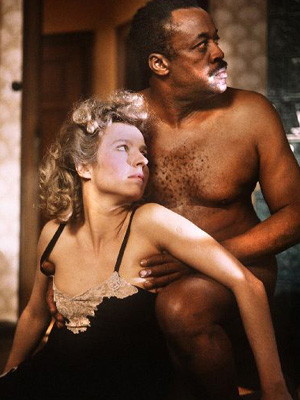
Marriage of Maria Braun, Dr. Fassbinder, 1979
The New Yorker article on the Chechen brothers who allegedly planted the bombs in Boston appeals to the educated informed readers of glossy mags who can feel as if, well, they understand a bit more about why such tragedies happen, and will now be able to add another small digit of imperialist prejudice to their perspective on the Caucuses, and Islam. This is branded thinking at work. These are all style codes and memes that serve as short hand for actual real thinking. For actual questioning. Perhaps everything Remnick wrote is exactly correct. It still doesn’t mean that article is not branding. Because in the end, the underclass is excised in the most paternalistic manner. If you uncritically take cops at their word, you have lost credibility.
In the same week the attack in Boston happens, CIA efforts to destabilize Venezuela are ramping up. Super hypocrite John Kerry asks for a recount. The fascist opposition means to move on Maduro, and Morales, too, for that matter. This has been what the U.S. government has done for sixty years.
*Believabilty*: well, here….Chris Kyle is the guy who runs Craft Security. Self branded “worlds deadliest sniper”.
http://www.hollywoodreporter.com/news/bradley-cooper-navy-seal-american-sniper-warner-bros-303006
All the Craft guys, by the way, at the Marathon were vets of Operation Enduring Freedom. Make of that what you will. But one might reasonably ask why they were hired to work security. I thought that’s what the Boston police deartment gets all that money for?
Believabilty. Here is a little footnote from the Craft web page (you too can get a Skull T shirt)….
http://www.thecraft.com/craft_skull.html
Hollywood is going to make the Chris Kyle movie. Hollywood alread made a film about Air America — a comedy!! With Mel Gibson. Because, you know, what’s funnier than secret wars and heroin smuggling.
 The questions are always there. After every tragedy, every attack, there are questions. Most go unanswered, but almost always there is an official version. It’s comforting. And it has to be *believable*. But it IS believable, because its official.
The questions are always there. After every tragedy, every attack, there are questions. Most go unanswered, but almost always there is an official version. It’s comforting. And it has to be *believable*. But it IS believable, because its official.
I wrote last posting that almost all studio product is set against the backdrop of white patriarchal privilege. Almost all of it is misogynist and almost all of it is racist. How can it not be? And included under the umbrella of this privileged narrative is an extensive militarism and worship of authority. The Pentagon might as well officially list itself as part time studio, such is the inter-relationship between Hollywood and the military. There is also another theme running under all this. This is the sense of empowerment an ever more desperate white masculinity feels, and the acute desire for legitimation of this masculinity through force. Jock culture is a strange parody of the military. What they both share is a violence toward women. In fact, toward anything not exactly like they are. Black jocks usually have just appropriated white jock culture. Not all, and the exceptions are worth a whole posting all by themselves.
Nice piece here by Dave Zirin..
http://www.thenation.com/blog/160408/shut-and-play-patriotism-jock-culture-and-limits-free-speech#

So, it is believable to have an Irish Catholic family of cops, but not, say, a poor Kurdish immigrant family of laborers, or maybe workers in the service sector. Why is that? Well, it is literally not believable to a large swath of the public because what that Kurdish, or Polish, or Albanian or Syrian or Moroccan or Belarussian family would feel and say is not part of the canon of accepted codes. If Hollywood attempted such a show — lets pretend an executive took a lot of LSD25 and somehow gave this show the green light there would of necessity be dialogue based on accepted white codes, which would read as *not believable* in the mouths of foreigners, OR it would be an honest dialogue, taken from the real material world of the working class, and THAT dialogue wouldn’t and couldn’t be heard. The working class in film usually must speak “working class”. It’s all very well defined. The working class must be seen in the accepted context, as well. There are exceptions, but I think you would be hard pressed to find many.
So, a Kurdish worker literally would not be heard. You might as well film the show IN Kurdish, or Polish, or whatever. For Polish is no more alien to most Americans than is the language of the underclass. The sensibility of those punished every day for poverty, for the abuse they endure, is usually radicalized in some sense — it has learned not to trust. It has learned subterfuge as well.
This is the same sense one gets arguing with people who say, oh, those inner city kids really need to pull up their pants. The dial always is turned back to one’s own privilege, assuming one is white. The dial is always set to conformity. (Why can’t they dress like I do, as I find acceptable?).

Today, the events in Boston play out over the electronic media much as a film would on a continuous loop. The audience looks for familiar characters, familiar events. And because the police are so familiar, this audience projects familiar plot points onto their actions. Ex NAVY seals are familiar too (didnt Costner play a Seal? or..what that Steven Segal? Hell, it seems maybe every young actor in Hollywood has) they are projected in mimetic readings, occupying the familiar roles this audience has seen thousands of times. One of the interesting things about how the CIA is depicted in Hollywood film, is that Langley is always the most appealing work place in America. Smiling and very cute secretaries, brusk but avuncular senior management, and hunky young recruits. How many thousands of times has this been seen? What is happening is a total break down of cognition I believe. Was Boston a movie? Was the guy in the wheel chair an actor? Thought there would be more blood…oh, well, the producers know what they’re doing. Is Wolf Blitzer playing himself?

The state has a budget for deception. Black ops. What does one think they do with that budget?
The state has been responsible for most atrocities, not all, over the last hundreds of years. The U.S. has lied constantly, they have lied so much they no longer know what is true. It has no meaning. Rumsfeld, Hillary, Bill, and Obama, or Kerry or Hagel or Wolfowitz, or Cheney or Biden or Petreus, or Wes Clark, or Poindexter, or Ollie North, or Allen Dulles or LBJ or Jerry Ford — or any of those who wander the corridors of power, they are above truth/false dichotomies; for they are in their own movies, too.

They are making the story and you are the audience. I have no idea what happened with the Tsarnaev brothers. I have no idea if the cover story is real. I can’t know. But I think that is what is real is the city of Boston was put on martial law status, locked down, and complied obediently. Perhaps there is a strange current of sado-masochism at work in this (beat me, make me write bad checks, put my city under martial law)…whatever it is, the society has as a whole has stopped thinking there is anything to question. After all, Matt Damon or Bradley Cooper will take care of everything.
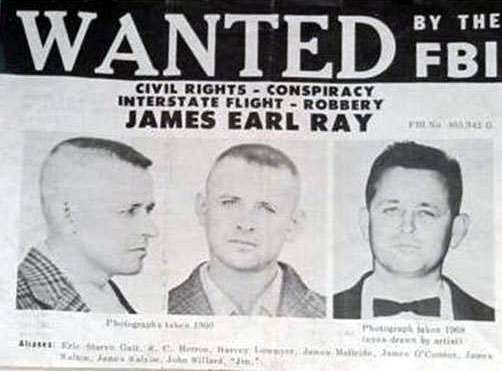

The chase, the shoot out….
“lockdown”. People have suddenly become comfortable with this term meaning everyone in their cells in prisonn right? It’s not curfew, ti’s not martial law, it’s “lockdown” – Americans have accepted the world is a prison controlled by the US executive and its soldiers. They agreed to stay in their cells, to lock themselves down. Really a movie in that suddenly this is the onl violence, and means violence – for’get the highway accidents and cop shootings in “the homeland” let alone the drones and death squads elsewhere. This is the violence that’s intolerable. Everything must be paused until they are stopped. And the drones? The bombed wedding parties? The industrial accidents deaths? The rape torture murders of the paramilitaries in Syria? The fascist violence in Venezuela? The forced feedings of the tortured in Guatanamo? Oh well the world is a rough neighborhood, This isn’t a perfect world and those motherfuckers shouldn’t be allowed to get away with that.
Maybe not coincidentally, I read Saramago’s Blindness this week while all this has been unfolding. There have been unsettling parallels, most notably, the state’s rush to quarantine the blind as soon as they discover the few instances of the “white sickness” and the internees willingness to be confined.
But to your point – believability, I’ve felt a sense of incredulity and disconnect between image and narrative. It does feel hallucinatory. This flood of information, all of it the same series of unsubstantiated “facts” or details, whether I’m watching TV or reading my Facebook feed – who was run over by the car? 200 rounds of ammunition were “exchanged”? What about the man who was forced to strip naked and hauled off in the police car? Did that really happen? I had friends in Boston sending happy pictures of their time in lockdown. Yesterday, I saw a picture of a cop in kevlar bringing two gallons of milk to a family who’d run out. No picture of the family “in need “- nice yard though, white fence, so probably not desperate and distrusting of the cops. Cop as milkman – isn’t that nostalgic.
I had concern for Dzhokhar Tsarnaev yesterday and it’s difficult to talk about it with most people I know because of a “believability” gap. When I worry that Tsarnaev won’t be read his rights, friends misunderstand – they think I’m concerned that he won’t get convicted if the cops don’t follow the rules. When I explain that Miranda rights don’t resemble the TV trope, they don’t believe me. When I talk about what this means in terms of the rest of us, they laugh or get defensive and talk about what they “believe.” The conversation resembles the conversation I had a few weeks ago about the distance between “the graphic scenes of torture” depicted in Zero Dark Thirty and what anyone could actually read about or see in documentaries or learn from first hand accounts. Are we all hallucinating now? Maybe so…
– right- the worry that something will stop the annihilation of this obvious guilty villain…
John I’m sure you have an opinion abou Emily Mann who runs the McCarter theatre at Princeton. it’s a nice theatre. She’s won awards. When I was uni I saw her first play, she workshopped it – Execution of Justice. Based on the Dan White trial “‘the twinkie defence”. it was such a reactionary shocking thing to me then; it was this ersatz left critical piece, targeted to wind up people with good affects and instincts (people upset about the murder of Harvey Milk) against defendant”‘s rights. It was a play designed to enrage people about” technicalities” so that the progressives whom it manipulated emotionally would be calling for star chamber. The longing for a divine justice dealing out divine judgements and infallibly detecting and exterminating Evil was sown by this pseudo progressive culture work of the reagan era. And under cover of this – this frenzy of outrage and misdirected demands after the red meat of simple anecdotal injustice is tossed to formerly rational progressives (it sdidn’t work on the majority then actually – the audience complained about the manipulation and the sensationalism – now it would work, and be celebrated widely by pseudo left pseudo critics)- the real mysteries of Dan White and the killing of the progressive mayor Mosconi who was blocking the real estate developers interests in SF and checking gentrification, are buried and speculation about them becomes “conspiracy theory” while “mature” ^politics is normalized as this idiotic childish gossip and anecdote, this false culturalist contextualizing. Worst deepest effect seen here is the slipping away of the specatcle from any critical awareness at all – now it is very rare for anyone to question the assumption that an act of spectacular violence (terrorist bombing) or a spectacular simulated violence (Rihann’s “Man Down”, say) is the natural way of expressing political arguments (against imperialism, against rape) – this provision of entertainments to sing along to or “debate” fades from view and just seems natural…though it is really odd and inexplicable.
I want to respond to all three of these comments in a short while here….but @elizabeth….
http://www.guardian.co.uk/commentisfree/2013/apr/20/boston-marathon-dzhokhar-tsarnaev-mirnada-rights
I posted the link to Greenwald yesterday. I got the Facebook equivalent of “you kids get off my lawn” ie. stop posting this negative stuff or I’m going to unfriend you – to which I reply, go right ahead, by all means, but I don’t think you understand how FB works. They have the idea that their newsfeed is their “private” space, but apparently mine is also theirs.
and here we go…hoopy dee doo..preparing with run throughs for major attacks on US cities…just like the TV shows and movies
http://abcnews.go.com/US/story?id=94708&page=1#.UXSS-4IrMmJ
This lockdown, or martial law, or whatever it was — its actually unlike anything I know…..is clearly the precursor for further policing tactics domestically. The militarizing of domestic police departments is a whole paradigm shift in how civil liberties are to be treated and that quaint old bill of rights. THere was small opposition to NDAA, and here we have a public happy to comply with orders to go inside and stay inside. All notions of a commons, of individual rights have been tossed out the window — the normalizing of mass police action was first seen after Katrina I think. So, the idea of enemy combatants is cover for all dissent.. Its astounding. But such is the ramping up of these ersatz threats that people seem happy to accept “protection”. http://www.globalresearch.ca/19-year-old-student-in-custody-president-obama-has-already-delivered-a-guilty-verdict-to-suspected-boston-bomber/5332325
@molly:
yeah emily mann. This is institutional theatre in the U.S. Its largely a factory for kitsch. But see, what you describe is fueled in part by these feelings, however buried they may be, of impotence and this dislocation of affect — I think these *common sense* appeals to what are really fascistic principles (Zizek again) means that what is being offered for selection from the supermarket of ideas, are pre fabricated faux empowerments….micro empowerments….that have no real importance except as psychological salves for this sense of being cut adrift from all processes of decision making. I suspect soon elections will be suspended and nobody will really care because they will be replaced by some reality TV show that is closer to shirley jackson than anything else.
Yeah that last comment – exactly, these commonsense appeals to fascism: this is helped along by the dismantling of narrative and the bombardment of the clerk class with these idiotic cartoons and cartoonish entertainments. Really the infanitilization is indispensible for foisting on people, and it goes along with Doug Henwood and Jacobin crowd these days saying oh democracy is just too much trouble, we don’t want to be in meetings all day. Because we’re watching teevee! Adulthood is too much. The kind of participatory democracy that adults practiced time out of mind, as in the Haudenosaunee Longhouse, is othered and eradicated – our idiot entertainments make it primitive or dangerous (shirley jackson) and female – KKK, PTA – as a technocratic absolute monarchy is naturalized.
The Judge and The Historian – by Carlo Ginzburg:
The relations between history and law have always been extremely close: this has been the case since, two and a half thousand years ago, the literary genre that we call ‘history’ emerged in Greece. If the word ‘history’ (historia) derives from the language of medicine, the argumentative capacity it implies perhaps derives from the juridical tradition. History as a particular intellectual activity is constituted ( as Arnaldo Momigliano reminded us a few years ago) at the crossroads of medicine and rhetoric: it examines cases and situations, seeking the natural causes according to the example of the first and following the rules to the second – an art of persuasion born in tribunals.
In the classical tradition, to historical exposition ( as, elsewhere, to poetry) one brings, in the first place, a quality the Greeks called enargheia, and the Latins called evidentia in narratione: the capacity to represent persons and situations vividly. Like a lawyer, an historian is obliged to convince with the use of a efficacious argument involving to a point the creation of an illusion of reality and less with the production of proof or the evaluation of proof produced by others. These latter are the proper activities of antiquarians and scholars, but until the second half of the 18th century, history and antiquarianism constituted intellectual environments entirely independent of one another, populated by a different set of individuals. At the time when a scholar like the Jesuit Henri Griffet, in his Traité des differentes sortes de preuves qui servent à établir la verité de l’histoire (1769), equated the historian with a judge who evaluates various bits of evidence and testimony, there was already manifest a requirement then unsatisfied, albeit remarked upon by few intellectuals. This was to be realized a few years later with Edward Gibbon’s The Decline and Fall of the Roman Empire, the first work to successfully combine history and antiquarian scholarship.
The analogy between the historian and the judge was destined for a great career. In the famous remark, first uttered by Schiller, Die Weltgeschichte ist das Weltgericht, Hegel condensed, in the duplicate sense of Weltgericht (‘world tribunal’ and ‘universal justice’), the essence of his own Philosophy of History: the secularization of the Christian vision of Universal History (Weltgeschichte.) The accent here falls on the verdict (with all the ambiguity with which it is pronounced): but it falls to the historian to judge people and events on the basis of a principle – the overriding interests of the State – tendentiously estranged as they may be either from law or from morality; In Griffet, on the other hand, the accent falls on that which precedes the verdict, that is on the impartial evaluation of proofs and testimony on the part of the judge. At the end of the century, Lord Acton, in his address spoken on the occasion of his nomination to the position of Regius Professor of Modern History at Cambridge (1895), insisted on both one and the other: historiography, when it is based upon documents; has to erect atop them a structure and become ‘a recognized tribunal, before which all are equal.’
[…]
For many historians, the notion of proof is out of fashion, as with the notion of truth, to which it is tied by a strong link historically (although not a necessary link). The reasons for this devaluation are various, not all of an intellectual order. One reason is certainly the hypertrophic status on both sides of the Atlantic, in France and in the United States, achieved by the term ‘representation.’ Given the use made of this, it ends in creating in many cases an insurmountable wall around history.
[…]
We know very well that every testimony is constructed according to a determined code: to attain to historical reality (or to reality) in a direct way is by definition impossible. But to infer from this an ultimate unknowability of reality is the result of a radically lazy scepticism which is at once unsustainable from an existential point of view and contradictory from a logical one: as such, the fundamental choice of the skeptic is not placed beneath the methodical doubt that he declares himself committed to.
For me, as for many others, the notions of ‘proof’ and of ‘truth’ are in contrast constitutive of my method as an historian. This does not imply, obviously, that non-existent phenomena or false documents are irrelevant historically: Bloch and Lefebvre taught us the contrary. But the analysis of representations must not be permitted to obscure the principle of reality. The non-existence of the band of brigands [ of the French revolutionary period, which Lefebvre studied in La grande peur] renders yet more significant (because more profound and revealing) the fear in the French countryside in the summer of 1789. An historian has the duty and the right to remark a problem there where a judge would have to dismiss the case for lack of evidence.
yes, that was the primary impetus for starting this blog in a sense…..to start to analyse the way narrative was being dismantled…exactly. And infantilized…..the constant constant repetition of the same simplistic narratives, the same characters (which barely meet the criteria to be called characters) placed in the same frame, over and over and over and over and over and over and over. And idolizing war and abstractions like patriotism…freedom…democracy….etc. The destruction of words such as democracy, which now means nothing. So, eventually this breakdown of thought occurs. Autism….this vapor lock on the engine of cognition. Frozen. Paralysed. And the worship of a fantasy technology — this manufactured dream of technical omniscience…..when in fact its quite deeply flawed. But real technical achievement is suppressed to large degree, and most is in the service of weaponizing everything…..for the military. The police have always been there to protect property. But now, that is even secondary, because the military and the police are merging, and the goal is simply control. Occupation. A vast gulag of american prisons, militarized police departments, and an utterly secret clandestine justice department. Anyone can be arrested for anything — thats the message. Say anything and you are a whistle blower, a dissident….an enemy combatant…..and forget niceties like the Miranda rights, or hell, due process….habeas corpus….thats all gone. Once NDAA passed, and nobody could tear themselves away from season two of Breaking Bad….the game was lost. These childish cover stories are just consumed in the EXACT same way TV shows are consumed. Exactly. Oh, I thought the casting for those brothers was over the top, but I loved the guy in the cowboy hat…..great performance. Its surreal. And a large city of millions is told to go inside. And they do. http://www.wsws.org/en/articles/2013/04/22/pers-a22.html